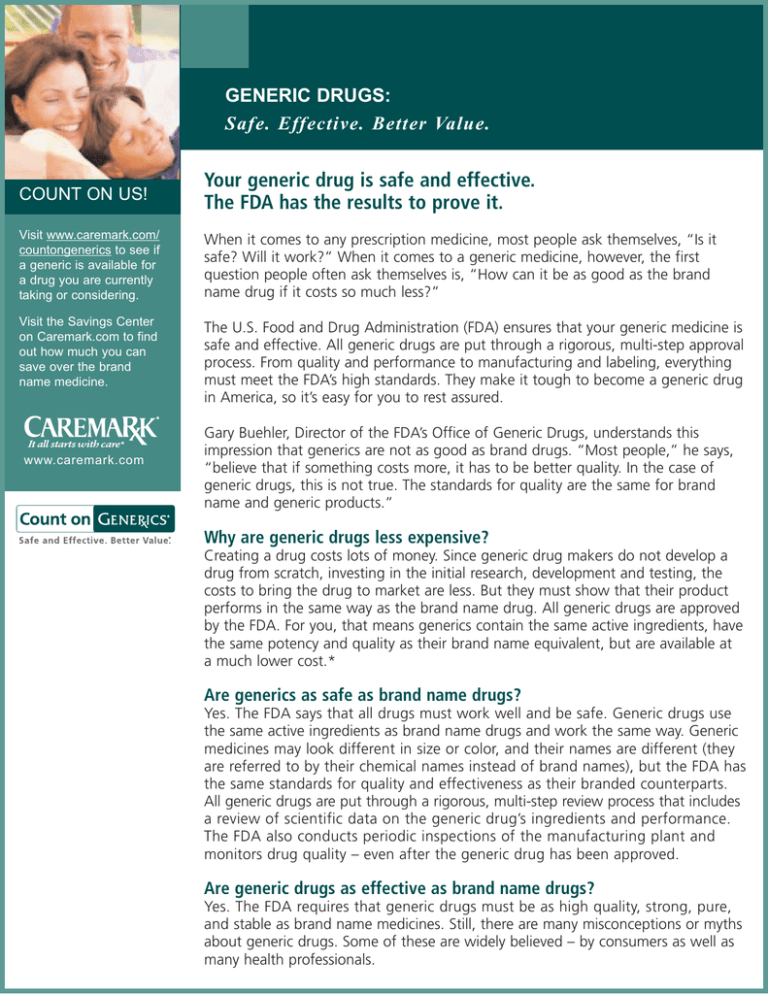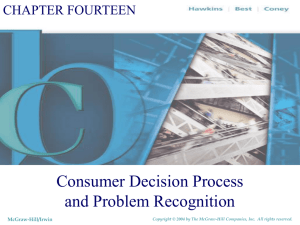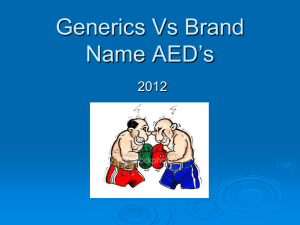
GENERIC DRUGS:
Safe. Effective. Better Value.
COUNT ON US!
Your generic drug is safe and effective.
The FDA has the results to prove it.
Visit www.caremark.com/
countongenerics to see if
a generic is available for
a drug you are currently
taking or considering.
When it comes to any prescription medicine, most people ask themselves, “Is it
safe? Will it work?” When it comes to a generic medicine, however, the first
question people often ask themselves is, “How can it be as good as the brand
name drug if it costs so much less?”
Visit the Savings Center
on Caremark.com to find
out how much you can
save over the brand
name medicine.
The U.S. Food and Drug Administration (FDA) ensures that your generic medicine is
safe and effective. All generic drugs are put through a rigorous, multi-step approval
process. From quality and performance to manufacturing and labeling, everything
must meet the FDA’s high standards. They make it tough to become a generic drug
in America, so it’s easy for you to rest assured.
www.caremark.com
Gary Buehler, Director of the FDA’s Office of Generic Drugs, understands this
impression that generics are not as good as brand drugs. “Most people,” he says,
“believe that if something costs more, it has to be better quality. In the case of
generic drugs, this is not true. The standards for quality are the same for brand
name and generic products.”
Why are generic drugs less expensive?
Creating a drug costs lots of money. Since generic drug makers do not develop a
drug from scratch, investing in the initial research, development and testing, the
costs to bring the drug to market are less. But they must show that their product
performs in the same way as the brand name drug. All generic drugs are approved
by the FDA. For you, that means generics contain the same active ingredients, have
the same potency and quality as their brand name equivalent, but are available at
a much lower cost.*
Are generics as safe as brand name drugs?
Yes. The FDA says that all drugs must work well and be safe. Generic drugs use
the same active ingredients as brand name drugs and work the same way. Generic
medicines may look different in size or color, and their names are different (they
are referred to by their chemical names instead of brand names), but the FDA has
the same standards for quality and effectiveness as their branded counterparts.
All generic drugs are put through a rigorous, multi-step review process that includes
a review of scientific data on the generic drug’s ingredients and performance.
The FDA also conducts periodic inspections of the manufacturing plant and
monitors drug quality – even after the generic drug has been approved.
Are generic drugs as effective as brand name drugs?
Yes. The FDA requires that generic drugs must be as high quality, strong, pure,
and stable as brand name medicines. Still, there are many misconceptions or myths
about generic drugs. Some of these are widely believed – by consumers as well as
many health professionals.
Myths and Facts about Generic Drugs
Myth #1: Generics are not as safe as brand name drugs.
Fact: The FDA requires that ALL drugs be safe and effective. The fact is that generics
use the same active ingredients as their brand name counterparts. The FDA monitors
reports of adverse drug reactions and has found no difference in side effects
between generic and brand name drugs.
Myth #2: Generics are not as potent as brand name drugs.
Fact: Generic drugs must have the same quality, strength, purity, and stability as
their brand name counterparts. It must be shown that generics work the same in
the body and have the same risk-benefit profile.
Myth #3: Generics take longer to act in the body.
Fact: The FDA requires that the generic drug must deliver the same amount of active
ingredients in the same amount of time as the original, brand name drug.
Myth #4: Brand name drugs are made in modern manufacturing facilities and
generics are often made in sub-standard facilities.
Fact: The FDA conducts about 3,500 inspections a year on all pharmaceutical
facilities, including generic manufacturers. Sub-standard facilities are not permitted
by the FDA.
What is the best source of information about generic drugs?
Contact your doctor, pharmacist or other healthcare professional for information on
generic drugs. If you still have questions about drug safety or effectiveness, the FDA
has set up a toll-free hotline at 1-888-463-6332. To learn more about generic drugs
online, you can also visit the FDA web site at: http://www.fda.gov/cder and click on
Consumer Education.
Good news for consumers
Many brand name drugs are about to lose patent protection, which means more
generics are coming into the marketplace. According to the Congressional Budget
Office, Americans save between $8 billion and $10 billion every year by choosing
generics.1
We recommend taking a proactive approach to reducing your own healthcare costs.
Learn as much as you can about generics; you’ll find a lot of useful information at
the Caremark Web site: www.caremark.com/countongenerics. Ask your doctor to
prescribe a generic medicine or allow substitutions at the pharmacy. If no generic
equivalent exists for a prescription you are taking, consider asking your doctor if
there is a generic alternative** medicine available to treat your condition. It’s up to
YOU to insist upon lower-cost generic medicines. The more you know about generic
medicines, the better prepared you will be to make sound healthcare choices.
1. www.fda.gov
*The amount of your savings will be based on your benefit plan. Source: Generic Pharmaceutical Association’s
Web site: www.gphaonline.org.
**A “generic alternative” is a therapeutic alternative utilizing a generic drug to treat the same condition.
©2007 Caremark. All rights reserved.
83-11297d


